- Home
- Robert E. Howard
The Savage Tales of Solomon Kane Page 16
The Savage Tales of Solomon Kane Read online
Page 16
“Some of your crew know me of old, Jonas Hardraker whom men call the Fishhawk.” Kane's voice was toneless but deep feeling hummed at the back of it. “And you well know why I have followed you from the Main to Portugal, from Portugal to England. Two years ago you sank a ship in the Caribees, ‘The Flying Heart' out of Dover. Thereon was a young girl, the daughter of – well, never mind the name. You remember the girl. The old man, her father, was a close friend to me, and many a time, in bygone years have I held his infant daughter on my knee – the infant who grew up to be torn by your foul hands, you black devil. Well, when the ship was taken, this maid fell into your clutches and shortly died. Death was more kind to her than you had been. Her father who learned of her fate from survivors of that massacre, went mad and is in such state to this day. She had no brothers, no one but that old man. None might avenge her –”
“Except you, Sir Galahad?” sneered the Fishhawk.
“Yes, I, you damned black swine!” roared Kane unexpectedly. The crash of his powerful voice almost shattered the ear drums and hardened buccaneers started and blenched. Nothing is more stunning or terrible than the sight of a man of icy nerves and iron control suddenly losing that control and flaming into a full withering blast of murderous fury. For a fleeting instant as he thundered those words, Kane was a fearful picture of primitive, relentless and incarnate passion. Then the storm passed instantly and he was his icy self again – cold as chill steel, calm and deadly as a cobra.
One black muzzle centered directly on Hardraker's breast, the other menaced the rest of the gang.
“Make your peace with God, pirate,” said Kane tonelessly, “for in another instant it will be too late.”
Now for the first time the pirate blenched.
“Great God,” he gasped, sweat beading his brow, “you'd not shoot me down like a jackal, without a chance?”
“That will I, Jonas Hardraker,” answered Kane, with never a tremor of voice or steely hand, “and with a joyful heart. Have you not committed all crimes under the sun? Are you not a stench in the nostrils of God and a black smirch on the books of men? Have you ever spared weakness or pitied helplessness? Shrink you from your fate, you black coward?”
With a terrific effort the pirate pulled himself together.
“Why, I shrink not. But it is you who are the coward.”
Menace and added fury clouded the cold eyes for an instant. Kane seemed to retreat within himself – to withdraw himself still further from human contact. He poised himself there on the stairs like some brooding unhuman thing – like a great black condor about to rend and slay.
“You are a coward,” continued the pirate recklessly, realizing – for he was no fool – that he had touched the one accessible chord in the Puritan's breast – the one weak spot in Kane's armor – vanity. Though he never boasted, Kane took a deep pride in the fact that whatever his many enemies said of him, no man had ever called him a coward.
“Mayhap I deserve killing in cold blood,” went on the Fishhawk, watching him narrowly, “but if you give me no chance to defend myself, men will name you poltroon.”
“The praise or the blame of man is vanity,” said Kane somberly. “And men know if I be coward or not.”
“But not I!” shouted Hardraker triumphantly. “An' you shoot me down I will go into Eternity, knowing you are a dastard, despite what men say or think of you!”
After all Kane, fanatic as he was, was still human. He tried to make himself believe that he cared not what this wretch said or thought, but in his heart he knew that so deep was his underlying vanity of courage, that if this pirate died with a scornful sneer on his lips, that he, Kane, would feel the sting all the rest of his life. He nodded grimly.
“So be it. You shall have your chance, though the Lord knoweth you deserve naught. Name your weapons.”
The Fishhawk's eyes narrowed. Kane's skill with the sword was a byword among the wild outcasts and rovers that wandered over the world. With pistols, he, Hardraker, would have no opportunity for trickery or to use his iron strength.
“Knives!” he snapped with a vicious clack of his strong white teeth.
Kane eyed him moodily for a moment, the pistols never wavering, then a faint grim smile spread over his dark countenance.
“Good enough; knives are scarce a gentleman's arm – but with one an end may be made which is neither quick nor painless.”
He turned to the pirates. “Throw down your weapons.” Sullenly they obeyed.
“Now loose the girl and the boy.” This also was done and Jack stretched his numbed limbs, felt the cut in his head, now clotted with dried blood, and took the whimpering Mary in his arms.
“Let the girl go,” he whispered, but Solomon shook his head.
“She could never get by the guards outside the house.”
Kane motioned Jack to stand part way up the stairs, with Mary behind him. He gave Hollinster the pistols and swiftly undid his sword belt and jacket, laying them on the lower step. Hardraker was laying aside his various weapons and stripping to his breeches.
“Watch them all,” Kane muttered. “I'll take care of the Fishhawk. If any other reaches for a weapon, shoot quick and straight. If I fall, flee up the stairs with the girl. But my brain is on fire with the blue flame of vengeance and I will not fall!”
The two men now approached each other, Kane bareheaded and in his shirt, Hardraker still wearing his knotted bandanna, but stripped to the waist. The pirate was armed with a long Turkish dagger which he held point upward. Kane held a dirk in front of him as a man holds a rapier. Experienced fighters, neither held his blade point down in the conventional manner – which is unscientific and awkward, except in special cases.
It was a strange, nightmare scene that was lighted by the guttering lanthorn on the wall: the pale youth with his pistols on the stair with the shrinking girl behind him, the fierce hairy faces ringed about the walls, reddened eyes glittering with savage intensity – the gleam on the dull blue blades – the tall figures in the center circling each other while their shadows kept pace with their movements, changing and shifting as they advanced or gave ground.
“Come in and fight, Puritan,” taunted the pirate, yet giving ground before Kane's steady though wary approach. “Think of the wench, Broadbrim!”
“Iam thinking of her, offal of Purgatory,” said Kane somberly. “There be many fires, scum, some hotter than others –” how deadly blue the blades shimmered in the lanthorn light! – “but save the fires of Hell – all fires – may be – quenched – by – blood!”
And Kane struck as a wolf leaps. Hardraker parried the straight thrust and springing in, struck upward with the venomous disembowelling stroke. Kane's down-turned point deflected the sweep of the blade and with a dynamic coil and release of steel-spring muscles, the pirate bounded backward out of reach. Kane came on in a relentless surge; he was ever the aggressor in any battle. He thrust like lightning for face and body and for an instant the pirate was too busy parrying the whistling strokes to launch an attack of his own. This could not last; a knife fight is necessarily short and deadly. The nature of the weapons prevents any long drawn play of fencing skill.
Now Hardraker, watching his opportunity, suddenly caught Kane's knife wrist in an iron grip and at the same time ripped savagely upward for the belly. Kane, at the cost of a badly cut hand, caught the uplunging wrist and checked the point an inch from his body. There for a moment they stood like statues glaring into each other's eyes, exerting all their strength.
Kane did not care for this style of fighting. He had rather trust the other way which was more swiftly deadly – the open free style, the leaping in and out, thrusting and parrying, where one relied on his quickness of hand and foot and eye, and gave and invited open strokes. But since it was to be a test of strength – so be it!
Hardraker had already begun to doubt. Never had he met a man his equal in sheer brute power, but now he found this Puritan as immovable as iron. He threw all his strength, which was im
mense, into his wrists and his powerfully braced legs. Kane had shifted his grip on his dirk to suit the emergency. At first grips, Hardraker had forced Kane's knife hand upward. Now Solomon held his dirk poised above the pirate's breast, point downward. His task at hand was to force down the hand that gripped his wrist until he could drive the dirk through Hardraker's breast. The Fishhawk's knife hand was held low, the blade upward; he sought to strain against Kane's arresting left hand and braced arm until he could rip open the Puritan's belly.
So there they strained, man to man, until the muscles bulged in tortured knots all over them and sweat stood out on their foreheads. The veins swelled in Hardraker's temples. In the watching ring breath hissed sharply between clenched teeth.
For awhile neither gained the advantage. Then slowly but surely, Kane began to force Hardraker backwards. The locked hands of the men did not change in their relative position but the pirate's whole body began to sway. The pirate's thin lips split in a ghastly grin of superhuman effort, in which there was no mirth. His face was like a grinning skull and the eyes bulged from their sockets. Inflexibly as Death, Kane's greater strength asserted itself. The Fishhawk bent slowly like a tree whose roots are ripped up and which falls slowly. His breath hissed and whistled as he fought fiercely to brace himself like steel, to regain his lost ground. But back and down he went, inch by inch, until after what seemed hours, his back was pressed hard against an oaken table top and Kane loomed over him like a harbinger of Doom.
Hardraker's right hand still gripped his dagger, his left hand was still locked on Kane's right wrist. But now Kane, holding the dagger point still at bay with his left, began to force his knife hand downward. It was slow agonizing hard work. The veins stood out on Kane's temples with the effort. Inch by inch, as he had forced the Fishhawk down on the table, he forced the dirk downward. The muscles coiled and swelled like tortured steel cables in the pirate's slowly bending left arm, but slowly the dirk descended. Sometimes the Fishhawk managed to halt its relentless course for an instant, but he could never force it back by a fraction of an inch. He wrenched desperately with his right hand which still gripped the Turkish dagger, but Kane's bloody left hand held it as in a steel vise.
Now the implacable dirk point was within an inch of the pirate's heaving breast, and Kane's deathly cold eyes matched the chill of the blue steel. Within two inches of that black heart the point stopped, held fixed by the desperation of the doomed man. What were those distended eyes seeing? There was a faraway glassy stare in them, though they were focussed on the dirk point which was the center of the universe to them. But what else did they see? – Sinking ships that the black sea drank and gurgled over? Coastal towns lit with red flame, where women screamed and through whose red glow dark figures leaped and blasphemed? Black seas, wild with winds and lit with the sheet lightning of an outraged heaven? Smoke and flame and red ruin – black shapes dangling at the yard-arms – writhing figures that fell from a plank laid out over the rail – a white girlish shape whose pallid lips framed frenzied pleas –?
From Hardraker's slavering lips burst a terrible scream. Kane's hand lurched downward – the dirk point sank into the breast. On the stairs Mary Garvin turned away, pressed her face against the dank wall to shut out sight – covered her ears to shut out sound.
Hardraker had dropped his dagger; he sought to tear loose his right to fend off that cruel dirk. But Kane held him, vise-like. Yet still the writhing pirate did not release Kane's wrist. Holding death at bay to the bitter end, he clutched and as Kane had forced the point to his breast, so he forced it into his heart – inch by inch. The sight brought cold sweat to the brows of the onlookers, but Kane's icy eyes never flickered. He too was thinking of a bloodstained deck and a weak young girl who cried in vain for mercy.
Hardraker's screams rose unbearably, thinned to a frightful thin squealing; not the cries of a coward afraid of the dark, but the blind unconscious howling of a man in his death agony. The hilt of the dirk almost touched his breast when the screaming broke in a ghastly strangled gurgling and then ceased. Blood burst from the ashy lips and the wrist in Kane's left hand went limp. Only then did the fingers of the left hand fall away from Kane's knife wrist – relaxed by the death they had striven so madly to hold at bay.
Silence lay like a white shroud over all. Kane wrenched his dirk clear and a trickle of seeping blood followed sluggishly, then ceased. The Puritan mechanically swished the blade through the air to shake off the red drops which clung to the steel, and as it flashed in the lanthorn light, it seemed to Jack Hollinster to glitter like a blue flame – a flame which had been quenched in scarlet.
Kane reached for his rapier. At that instant, Hollinster, jerking himself out of his trance-like mood, saw the man Sam stealthily lift a pistol and aim at the Puritan. Sight and action were as one. At the crash of Jack's shot Sam screamed and reared upright, his pistol exploding in the air. He had been crouched directly under the lanthorn. As he flung out his arms in his death throes, the pistol barrel struck the lanthorn and shattered it, plunging the cellar into instant blackness.
Instantly the darkness crashed into sound, strident and blasphemous. Kegs were upset, men fell over each other and swore soulfully, steel clashed and pistols cracked as men found them with groping hands and fired at random. Somebody howled profanely as one of these blind bullets found a mark. Jack had the girl by the arm and was half leading, half carrying her up the dark stairs. He slipped and stumbled, but eventually reached the top and flung open the heavy door. A faint light which this opening let in showed him a man just behind him and a dim flood of figures scrambling up the lower steps.
Hollinster swung the remaining loaded pistol around, then Kane's voice spoke:
“'Tis I – Kane – young sir. Out swiftly, with your lady.”
Hollinster obeyed and Kane, leaping out after him, turned and slammed the oaken door in the faces of the yelling horde which surged up from below. He dropped a strong bolt into place and then stepped back, eyeing his work with satisfaction. Inside sounded muffled yells, hammerings and shots, and in places the wood of the door bulged outward as bullets chunked into the other side. But none of the soft lead went entirely through the thick hard panels.
“And now what?” asked Jack, turning to the tall Puritan. He noticed for the first time that a bizarre figure lay at his feet – a dead pirate with ear rings and gay sash, whose futile sword and useless musket lay beside him. Undoubtedly the sentry whose watch Kane's silent sword had ended.
The Puritan casually shoved the corpse aside with his foot and motioned the two lovers to follow him. He led the way up a short flight of wooden steps, down a dark hallway, into a chamber, then halted. The chamber was lit by a large candle on a table.
“Wait here a moment,” he requested. “Most of the evil ones are confined below, but there be guards without – some five or six men. I slipped between them as I came, but now the moon is out and we must be wary. I will look through an outer window and see if I can spy any.”
Left alone in the great chamber, Jack looked at Mary in love and pity. This had been a hectic night for any girl. And Mary, poor child, had never been used to violence and ill treatment. Her face was so pale that Jack wondered if the color would ever come back into her once rosy cheeks. Her eyes were wide and haunted, though trusting when she looked at her lover.
He drew her gently into his arms. “Mary girl –” he began tenderly when, looking over his shoulder, she screamed, her eyes flaring with new terror. Instantaneously came the scrape of a rusty bolt.
Hollinster whirled. A black opening gaped in the wall where formerly had been only one of the regular panels. Before it stood Sir George Banway, eyes blazing, garments dishevelled, pistol leveled.
Jack flung Mary aside and threw up his weapon. The two shots crashed together. Hollinster felt the bullet cut the skin on his cheek like a red-hot razor edge. A bit of cloth flew from Sir George's shirt bosom. With a sobbing gasp of curse he went down – then as Jack turned back to
the horrified girl, Banway reeled up again. He was drinking in the air in great gasps as if his breath had been driven out of him, but he did not seem hurt and there was no spot of blood about him.
Aghast and astounded – for he knew the ball had struck squarely – Jack stood gaping, dazed, holding the smoking pistol, until Sir George knocked him sprawling with a hard buffet of his fist. Then Hollinster bounded up, raging, but in that second Banway snatched the girl, and dragging her in a brutal grip, leaped back through the opening with her, slamming shut the secret panel. Solomon Kane, returning as fast as his long legs could carry him, found Hollinster raving and bruising his bare fists against a blank wall.
A few gasping words interlarded with wild blasphemies and burning self-reproaches, gave Kane the situation.
“The hand of Satan is over him,” raved the frantic youth. “Full in the breast I shot him – yet he took no hurt! Oh, fool and drooling imbecile I am – I stood there like an image instead of rushing him with the barrel for a club – stood there like a blind, dumb fool while he –”
“Fool that I am, not to have thought that this house might have secret passages,” said the Puritan. “Of course this secret doorway leads into the cellar. But stay –” as Hollinster would have attacked the panel with the dead sailor's cutlass which Kane had brought. “Even if we open the secret door and go into the cellar that way, or back through the bolted stair-door, they will shoot us like rabbits, uselessly. Now be calm for a moment, and harken:
“You saw that dark passageway leading out of the cellar? Well, it is in my mind that must be a tunnel which leads to the rocks along the sea shore. Banway has long been in league with smugglers and pirates. Spies have never seen any bundles carried into the house or out, though. It follows therefore that there needs must be a tunnel connecting the cellar with the sea. Therefore, it likewise follows that these rogues, with Sir George – who can never bide in England after this night – will run through the tunnel and take to ship. We will go across the beach and meet them as they emerge.”

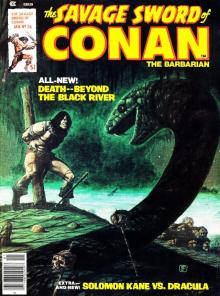 Beyond the Black River
Beyond the Black River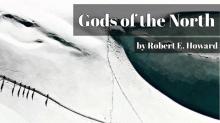 Gods of the North
Gods of the North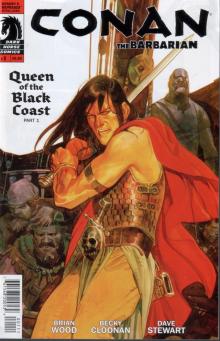 Queen of the Black Coast
Queen of the Black Coast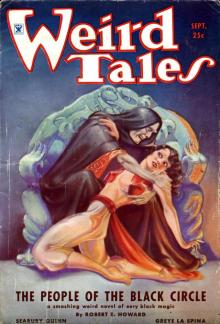 The People of the Black Circle
The People of the Black Circle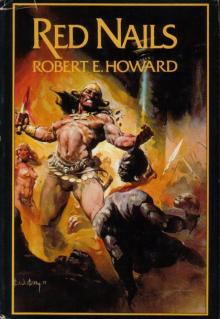 Red Nails
Red Nails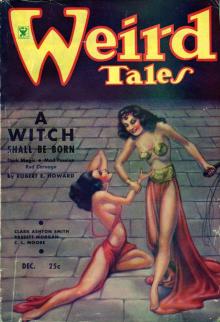 A Witch Shall Be Born
A Witch Shall Be Born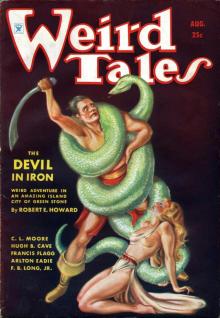 The Devil in Iron
The Devil in Iron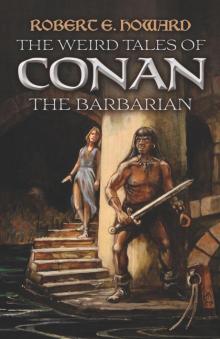 The Weird Tales of Conan the Barbarian
The Weird Tales of Conan the Barbarian The Bloody Crown of Conan
The Bloody Crown of Conan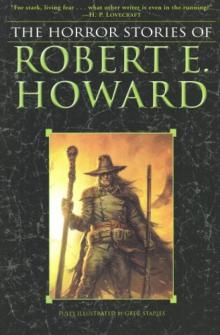 The Horror Stories of Robert E. Howard
The Horror Stories of Robert E. Howard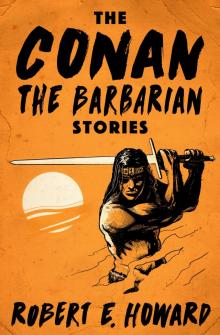 Conan the Conqueror
Conan the Conqueror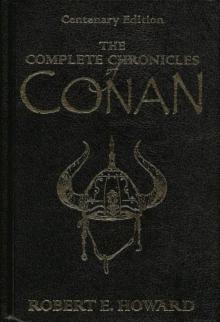 Conan the Barbarian
Conan the Barbarian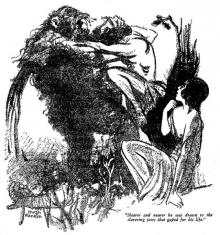 Shadows in the Moonlight
Shadows in the Moonlight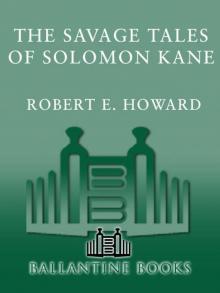 The Savage Tales of Solomon Kane
The Savage Tales of Solomon Kane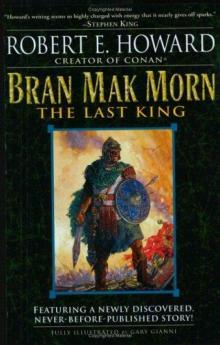 Bran Mak Morn: The Last King
Bran Mak Morn: The Last King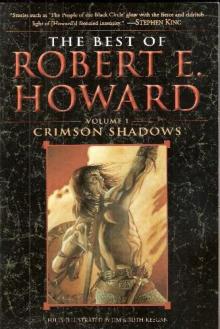 The Best of Robert E. Howard Volume One: Crimson Shadows
The Best of Robert E. Howard Volume One: Crimson Shadows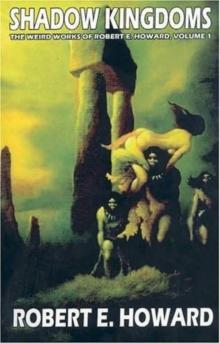 The Best of Robert E. Howard: Crimson Shadows (Volume 1)
The Best of Robert E. Howard: Crimson Shadows (Volume 1)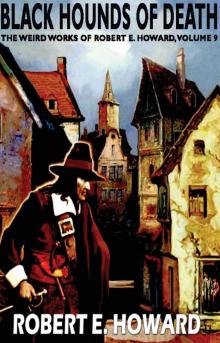 Black Hounds of Death
Black Hounds of Death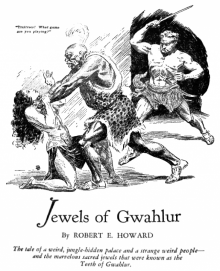 Jewels of Gwahlur
Jewels of Gwahlur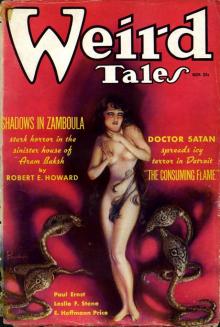 Shadows in Zamboula
Shadows in Zamboula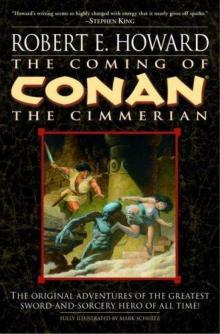 The Coming of Conan the Cimmerian
The Coming of Conan the Cimmerian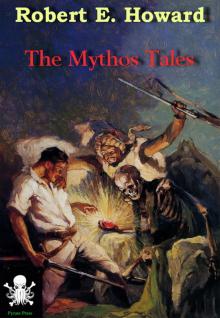 The Mythos Tales
The Mythos Tales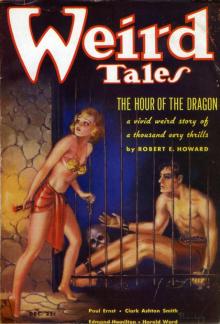 The Hour of the Dragon
The Hour of the Dragon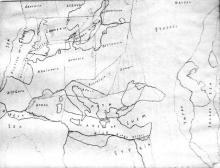 The Hyborian Age
The Hyborian Age El Borak and Other Desert Adventures
El Borak and Other Desert Adventures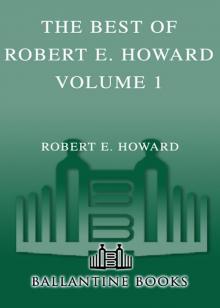 The Best of Robert E. Howard Volume 1 The Best of Robert E. Howard Volume 1
The Best of Robert E. Howard Volume 1 The Best of Robert E. Howard Volume 1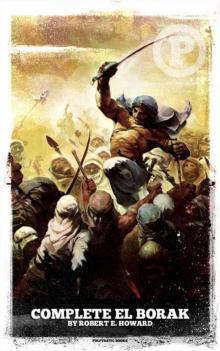 El Borak: The Complete Tales
El Borak: The Complete Tales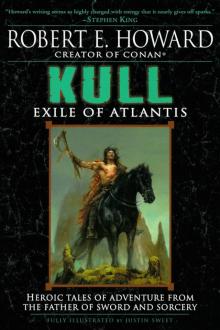 Kull: Exile of Atlantis
Kull: Exile of Atlantis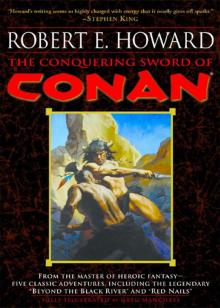 The Conquering Sword of Conan
The Conquering Sword of Conan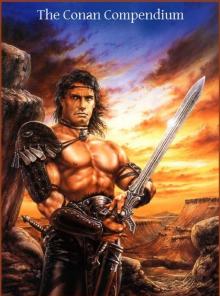 The Conan Compendium
The Conan Compendium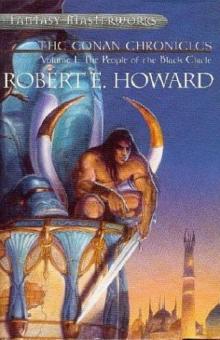 The Conan Chronicles: Volume 1: The People of the Black Circle
The Conan Chronicles: Volume 1: The People of the Black Circle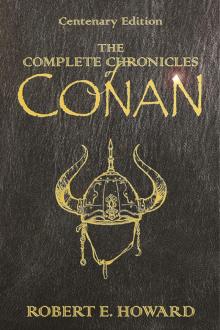 The Complete Chronicles of Conan: Centenary Edition
The Complete Chronicles of Conan: Centenary Edition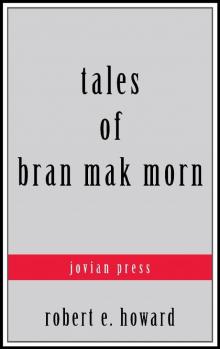 Tales of Bran Mak Morn (Serapis Classics)
Tales of Bran Mak Morn (Serapis Classics)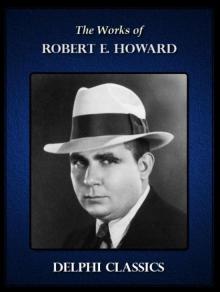 Delphi Works of Robert E. Howard (Illustrated) (Series Four)
Delphi Works of Robert E. Howard (Illustrated) (Series Four)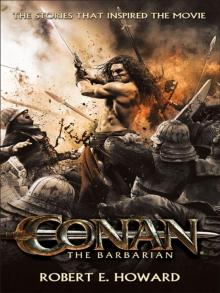 Conan the Barbarian: The Stories That Inspired the Movie
Conan the Barbarian: The Stories That Inspired the Movie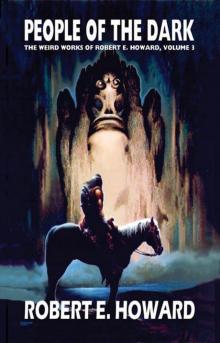 People of the Dark Robert Ervin Howard
People of the Dark Robert Ervin Howard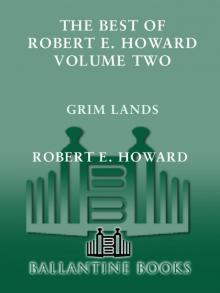 Grim Lands
Grim Lands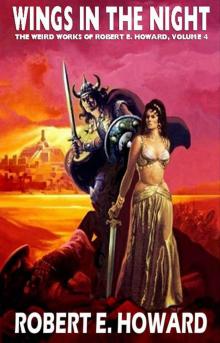 Wings in the Night
Wings in the Night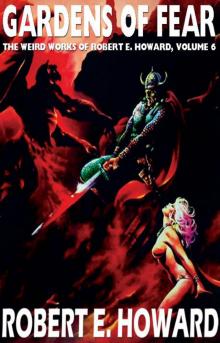 Gardens of Fear
Gardens of Fear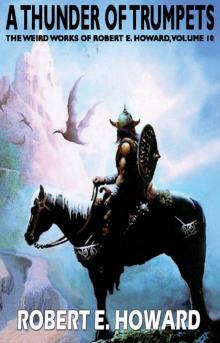 A Thunder of Trumpets
A Thunder of Trumpets Detective of the Occult
Detective of the Occult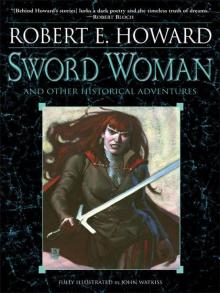 Sword Woman and Other Historical Adventures
Sword Woman and Other Historical Adventures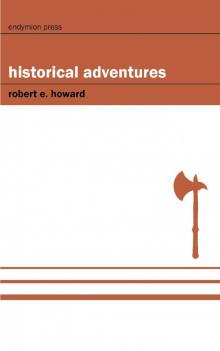 Historical Adventures
Historical Adventures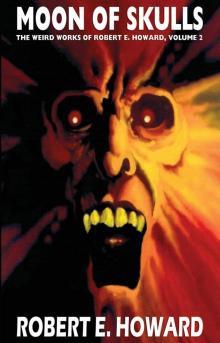 Moon of Skulls
Moon of Skulls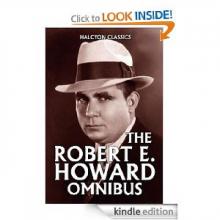 The Robert E. Howard Omnibus: 97 Collected Stories
The Robert E. Howard Omnibus: 97 Collected Stories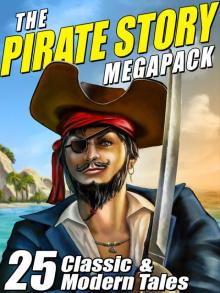 The Pirate Story Megapack: 25 Classic and Modern Tales
The Pirate Story Megapack: 25 Classic and Modern Tales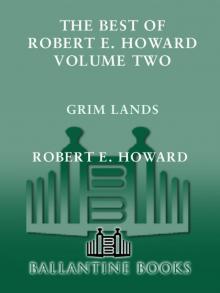 The Best of Robert E. Howard, Volume 2
The Best of Robert E. Howard, Volume 2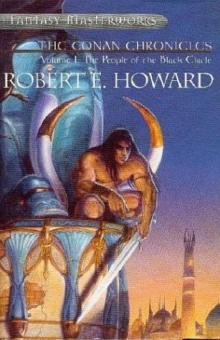 The Conan Chronicles, Vol. 1: The People of the Black Circle
The Conan Chronicles, Vol. 1: The People of the Black Circle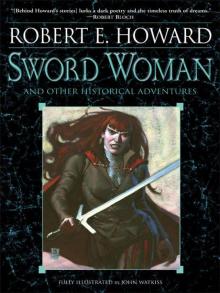 Sword Woman and Other Historical Adventures M
Sword Woman and Other Historical Adventures M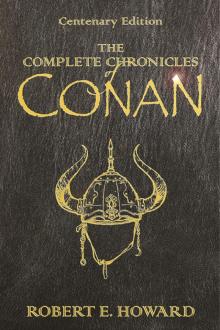 The Complete Chronicles of Conan
The Complete Chronicles of Conan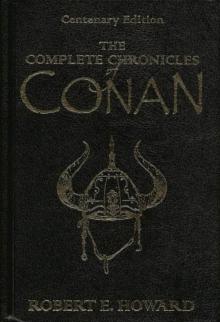 Conan the Barbarian: The Chronicles of Conan (collected short stories)
Conan the Barbarian: The Chronicles of Conan (collected short stories)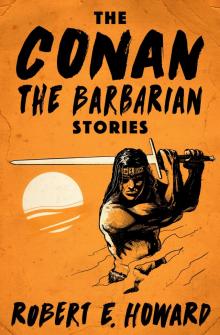 The Conan the Barbarian Stories
The Conan the Barbarian Stories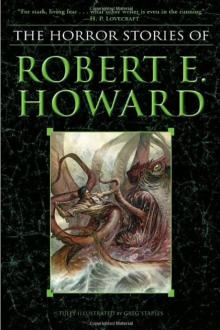 The Best Horror Stories of
The Best Horror Stories of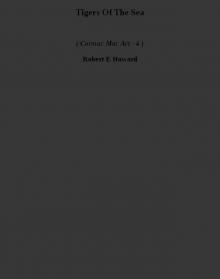 Tigers Of The Sea cma-4
Tigers Of The Sea cma-4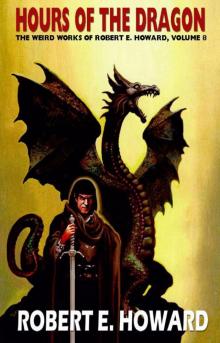 The Hours of the Dragon
The Hours of the Dragon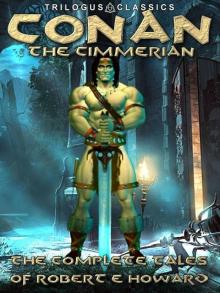 Conan the Cimmerian: The Complete Tales (Trilogus Classics)
Conan the Cimmerian: The Complete Tales (Trilogus Classics)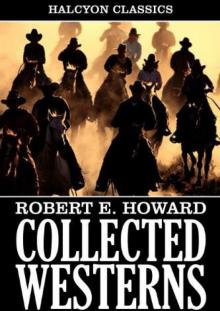 Collected Western Stories of Robert E. Howard (Unexpurgated Edition) (Halcyon Classics)
Collected Western Stories of Robert E. Howard (Unexpurgated Edition) (Halcyon Classics)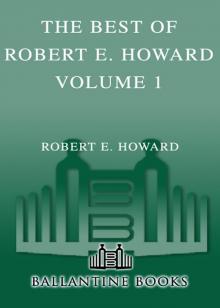 The Best of Robert E. Howard, Volume 1
The Best of Robert E. Howard, Volume 1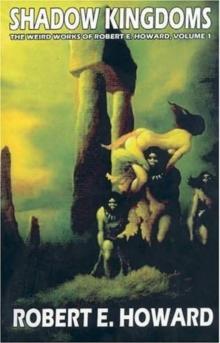 Shadow Kingdoms
Shadow Kingdoms